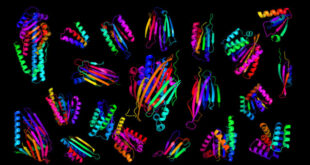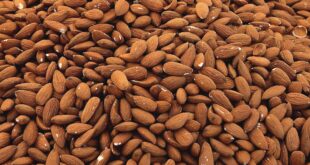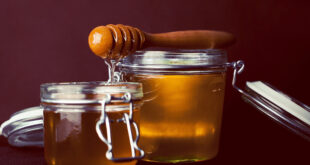A phenolic-rich extract from maple syrup can make disease-causing bacteria more susceptible to common antibiotics, according to new research from McGill University.
A maple syrup extract increases the potency of common antibiotics. Image credit: Three-Shots.
“Native populations in Canada have long used maple syrup to fight infections. I’ve always been interested in the science behind these folk medicines,” said lead author Dr. Nathalie Tufenkji, a principal investigator in the Biocolloids and Surfaces Laboratory in the Department of Chemical Engineering at McGill University.
The idea for the project really gelled when Dr. Tufenkji, who had been studying the antimicrobial effects of cranberry extracts, learned of the anti-cancer properties of a phenolic maple syrup extract.
“That gave me the idea to check its antimicrobial activity,” she said.
Dr. Tufenkji and co-authors separated the sugar and water from the syrup’s phenolic compounds, which contribute to maple syrup’s signature golden hue.
In an initial test, they exposed several disease-causing bacterial strains to the extract, but they didn’t see much of an effect.
Rather than give up on maple syrup altogether, they decided to check whether the extract could enhance the antimicrobial potency of the commonly used antibiotics ciprofloxacin and carbenicillin.
When the team mixed the phenolic extract with either of these medicines, they indeed found a synergistic effect, allowing them to get the same antimicrobial effect with upwards of 90% less antibiotic. The approach worked on a variety of bacterial strains.
“Our tests showed that a phenolic-rich extract from maple syrup — obtained by solvent extraction of commercial maple syrup — gave a major boost to the commonly used antibiotics, ciprofloxacin and carbenicillin, in killing gram-negative clinical strains of Escherichia coli, Proteus mirabilis and Pseudomonas aeruginosa,” the authors explained.
Building on this work, the scientists next tested the extract in fruit flies and moth larvae.
They dosed fly food with pathogenic bacteria and antibiotic, with and without the phenolic extract. Flies with meals doused in maple syrup extract lived for days longer than those denied the syrupy topper.
The researchers observed a similar outcome with the moth larvae.
To figure out how the extract makes antibiotics work better, the authors investigated whether the extract changed the permeability of bacterial cells.
The extract increased the permeability of the bacteria, suggesting that it helps antibiotics gain access to the interior of bacterial cells.
Another experiment suggested that the extract may work by a second mechanism as well, disabling the bacterial pump that normally removes antibiotics from these cells.
Currently, the team is testing the maple syrup extract in mice.
“While it is likely to be years before it would be available to patients as a prescribed medical protocol, and a pharmaceutical company would likely need to purify the extract further to avoid any potential allergic reactions, I’m hopeful that it may have an edge over other would-be medications thanks to its source,” Dr. Tufenkji said.
“There are other products out there that boost antibiotic strength, but this may be the only one that comes from nature.”
Dr. Tufenkji and her colleagues presented their results yesterday at the 253rd National Meeting Exposition of the American Chemical Society in San Francisco, CA.
_____
Nathalie Tufenkji et al. 2017. Phenolic rich maple syrup extracts synergize with antibiotics. 253rd ACS National Meeting Exposition, abstract AGFD 21
 #Bizwhiznetwork.com Innovation ΛI |Technology News
#Bizwhiznetwork.com Innovation ΛI |Technology News




